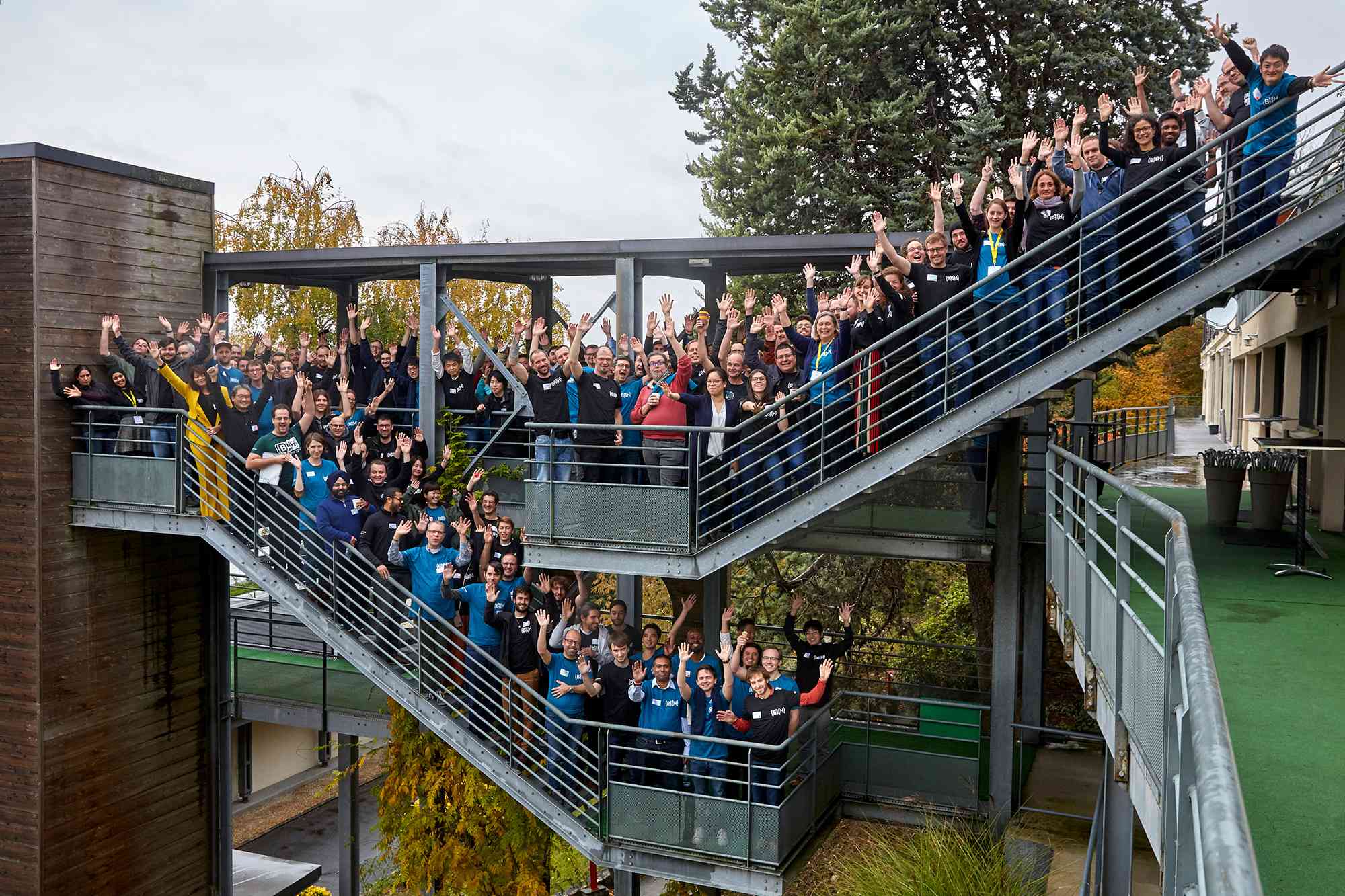Over 150 bioinformaticians, trainers, software developers and life science enthusiasts travelled from 21 countries across four continents to gather together in Paris, France, for BioHackathon Europe. Participants spent a week in November working collaboratively on over 30 projects aimed at improving software and methods for life science resources.
Creating an environment for innovation
Quite frequently, due to limitations of time and resources, many improvements to software, standards, or workflows are unable to be carried out. The BioHackathon is a unique event that offers an opportunity for these improvements to be worked on and completed. Few other events are able to offer such a diverse melting pot of developers and researchers able to work collaboratively and intensively over a matter of days to try and complete these tasks.
Project themes were diverse, ranging from rare disease pathway maps to plant genotyping metadata standardisations to FAIR identifier mapping. Some projects were building on developments in projects that had occurred in the first BioHackathon Europe in 2018. This was also the first year that industry was invited to submit projects, and there were several attendees from companies including Google, Oracle, and BASF looking to share their expertise, learn, and collaborate on open source projects.
The BioHackathon even led to some completely new resources being developed: Ivan Topolsky usually works on V-pipe, a bioinformatics pipeline for viral sequencing data at the Swiss Institute of Bioinformatics (SIB) - at the BioHackathon he was one of the developers working on a project to create a semantic recommendation system for life sciences publications, called ‘QuackQuack’ that had begun the previous year. Watch the video below to hear more about the project and what he had learnt from attending the BioHackathon.
It was a great and productive time with a fantastic and hard-working team at #bh2019europe. Thanks heaps to the organizers from @ELIXIREurope for a very cool hackathon. Looking forward to 2020! @larsjuhljensen @DoktorYak @kpj_py @coldc0de @AnilBey @t_teogene pic.twitter.com/2mBu6HXVwO
— Andreas Steffen (@creatules) November 22, 2019
How the event unfolded
The event began on Monday 18 November with a series of short-talks setting the scene for the event. ELIXIR Tools Platform lead, Jen Harrow, opened the event and introduced Toshiaki Katayama, founder of the original BioHackathon in Japan. Katayama explained the history of over 10 years of hacking on life science projects in Japan, and the origin of both the Japanese and the European BioHackathon.
Katayama’s colleague, Tazro Ohta, who also organises the BioHackathon in Japan commented on the origins of the original event. “When we started in 2008, no one knew about the idea of a ‘hackathon’ and so we wrote a proposal to our institute (Database Center for Life Science in Japan) for ‘a 7 day coding camp where we can collaborate with each other’. We had to argue that this is the best way to collaborate with people from different institutes. It’s the very best way to collaborate, rather than attending a normal scientific conference where people just talk about their research and there’s less communication between each other.”
 The following talk came from Emmy Tsang from eLIFE, who introduced their eLife sprint that took place earlier in the year, and shared details of their Innovation Leaders mentoring scheme. Piotr Prins from the University of Tennessee and director of genenetwork.org took the final slot to highlight opportunities in publishing outputs of the BioHackathon projects in biohackrxiv, a new preprint server currently in development.
The following talk came from Emmy Tsang from eLIFE, who introduced their eLife sprint that took place earlier in the year, and shared details of their Innovation Leaders mentoring scheme. Piotr Prins from the University of Tennessee and director of genenetwork.org took the final slot to highlight opportunities in publishing outputs of the BioHackathon projects in biohackrxiv, a new preprint server currently in development.
Each project lead then had an opportunity to pitch their project in a two minute flash-talk. Following this the hacking began and continued until Friday morning. The hacking groups were highly dynamic and cooperative with groups frequently calling on the expertise of others and individuals swapping projects to help out with specific tasks. This spirit of working intensively face-to-face on a short-term project with a group of people with diverse sets of expertise was praised by attendees.
Giacomo Tartari from the National Research Centre of Italy (CNR) said “I love the BioHackathon! I love the people, the sense of belonging, the easy chit chat with folks that are long time 'virtual acquaintances' and you can finally meet them in person. The difficult problems seem less hard when you confront them with friends around the same table. And on top of that you actually get things done!”.

Further information
The project topics are listed here and the highlights of the project outcomes are documented in this twitter thread, and using the hashtag #BH2019Europe. You can view all of the photos from the event at the BioHackathon 2019 Flickr album. We will adding new videos to the Flickr album over the next few weeks, so please check back to hear more about people’s experiences at the BioHackathon 2019!
The next BioHackathon is to take place 9 - 13 November 2020, this time held in Barcelona, Spain. Keep an eye on the BioHackathon Europe website over the next few months to keep up to date with project proposal submission and registration information.